Some people say, [If you don’t supplement calcium in spring, you miss a whole year].
Spring is regarded as the golden period for growing taller and often as the golden period for supplementing calcium because the sunshine is right and the ingredients are right at that time.
In fact, the baby’s calcium supplement has nothing to do with the season. As long as the baby lacks calcium, it needs calcium supplement.
However, what is calcium deficiency?
After Baidu casually took a look at [the baby’s calcium deficiency performance], all the results jumped out were like this…….
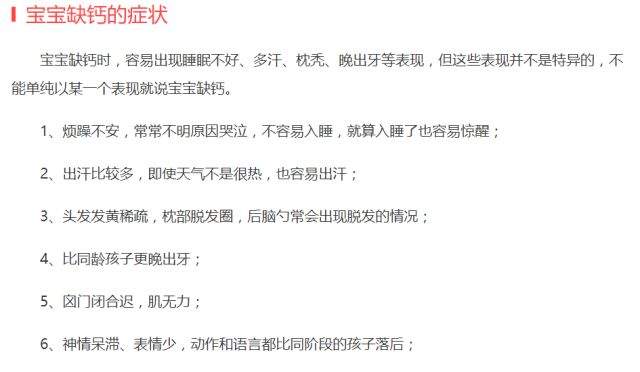
Children have late teeth, poor sleep, bald pillows, less hair, poor eating, and even children like to make faces, which are generally called [calcium deficiency].
Today, what clove mother wants to say to everyone is…….
All these manifestations are not calcium deficiency.
It is not difficult to supplement calcium to the baby, but if it is not supplemented correctly or excessively, it will also be harmful to the baby’s body.
The following words have been repeated N times by Clove’s mother in previous articles, and I still want to nag you N+1 times here today:
- Is pillow baldness calcium deficiency? That’s what babies often lie down and rub off! Is yellow hair calcium deficient? That’s because the baby’s fetal hair hasn’t changed yet! Is it calcium deficiency that sweats easily? That’s because the child is hot! Is it calcium deficiency that comes out late? That’s because of heredity, and so on! Is it calcium deficiency that is easy to wake up? There are many reasons for that. It may be that the baby has flatulence, colic, too cold, too hot, urinating, missing his mother… Is it calcium deficiency that makes faces? Is the child willing to let it go?……

It is actually very difficult for babies to lack calcium.

In a word, as long as the baby drinks milk normally, it is basically difficult to lack calcium.
< < Reference Intake of Dietary Nutrients for Chinese Residents (2013 Edition) > > The recommended calcium intake for children of different ages is distinguished as follows:
- For babies aged 0 ~ 6 months, 200 milligrams of calcium should be taken every day. For babies aged 7-12 months, 250 milligrams of calcium should be taken every day. Babies aged 1-3 should take 600 milligrams of calcium every day.
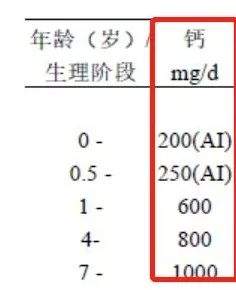
For babies within 6 months old, the daily food is mainly breast milk or formula milk.
Generally speaking, the calcium in breast milk is enough to meet the needs of children (200 milligrams of calcium are contained in every 600 mL of breast milk). Moreover, the appropriate intake of calcium within one year old is calculated from the calcium content in breast milk.
Babies who drink formula milk are more convenient for their mothers to control the amount of milk according to the calcium content in milk powder, not to mention worrying about calcium deficiency.
< < the global infant formula standard published by the European Society for Pediatric Gastrointestinal Liver Disease Nutrition (ESPGHAN) > > shows that 330-940 milligrams of calcium should be contained per 1000 milliliters of formula milk.
Even if you drink the lowest version of formula milk, you can reach the standard of supplementing 250 milligrams of calcium.

Six months later, the baby began to add supplementary foods, and the sources of calcium intake also increased. Green leafy vegetables and beans are rich in calcium.
It is even more difficult to think of [calcium deficiency].
During this period of time, even if children do not have other sources of calcium intake, it is unlikely that they will lack calcium if they guarantee 600-800 mL of milk every day.
After the age of 1, the sources of calcium intake for babies are more diverse. Original cheese, yogurt, dried shrimps, dried bean curd and other healthy snacks can be used as sources of calcium intake for babies.
Moreover, the baby can start drinking milk at this time, and only 400 ~ 500 mL of milk needs to be guaranteed every day, which is enough to meet the baby’s demand for calcium.
The recommended calcium intake after the age of 1 has been greatly increased. If parents are still worried about the insufficient calcium intake of their babies, they can need the help of professional doctors or nutritionists, and judge whether the babies lack calcium or not on the basis of diet review.
In this way, is [calcium deficiency] much more difficult than [calcium supplement]?
However, some mothers will say, [I know all this, but my baby has had bone mineral density and blood calcium tests in the hospital, and the results show that it is calcium deficiency. Can I not supplement it? ]
Our answer is still: no supplement!
Why do you say that? Next, let’s talk about why in detail.
Low bone density is calcium deficiency? Wrong
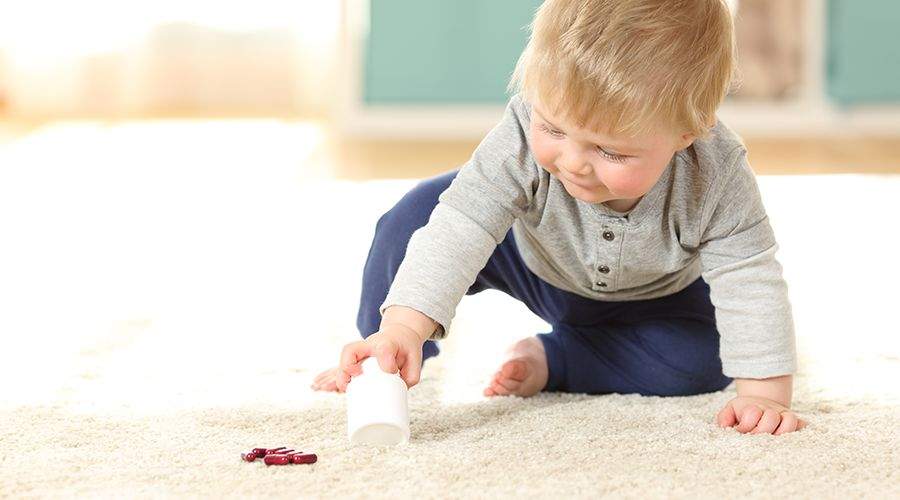
At present, there will always be an examination called [bone mineral density test] in the family barrel of children’s physical examination.
Don’t believe it, most of the baby’s measured results are low bone mineral density, a look is to supplement calcium.


The so-called bone mineral density test checks the content of minerals in bones, and calcium is the main mineral in human bones, so we often use bone mineral density test to judge whether a person lacks calcium or not.
It sounds like if you give your child bone density, you can know if your child is calcium deficient.
However, there is always a but!
For babies, there is no corresponding reference range for bone mineral density at present. Clinically, adult standards have been used to judge the bone mineral density of children.
The bone mineral density of children itself is lower than that of adults, and the bone mineral density standard of adults has been used to measure children in the period of rapid growth and development. Can the measured bone mineral density not be low?
Infants and young children should have a corresponding reference range of bone mineral density, but at present due to many interference factors, it is technically impossible to determine a proprietary standard for judging children’s bone mineral density.
For bone mineral density tests that do not even have standards, what should be used to believe the results of calcium deficiency.
Can blood calcium measurement judge the baby’s calcium deficiency? Wrong!
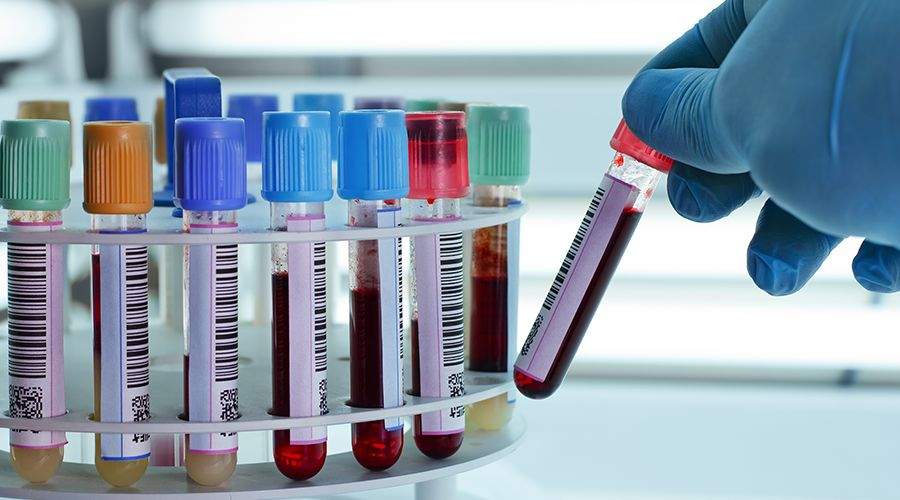
99% of human calcium is in bones and teeth, and only 1% of calcium is free in tissue fluid and blood.
When the calcium content in the blood is insufficient, regulated by hormones such as growth hormone and calcitonin, a certain amount of calcium will be automatically freed from the bone to supplement the calcium in the serum.
It can be understood as follows: even if people are already short of calcium, the calcium content in blood will not change what.
The Chinese Journal of Pediatrics once published an article clearly pointing out that blood calcium level cannot be used to judge the calcium nutrition status of human body.
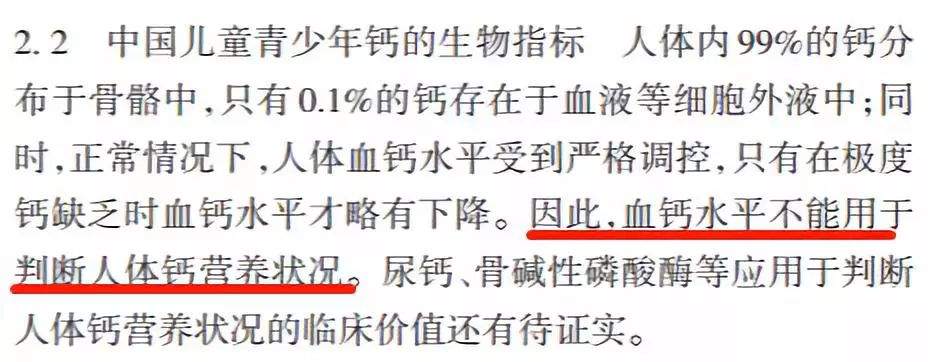
Therefore, we say that it is not appropriate to judge whether a child is calcium deficient by the calcium content in the blood night.
For the vast majority of children, it is not calcium that should be supplemented, but vitamin D. Only when vitamin D is supplemented in place can calcium be better absorbed by the baby.
How much do you eat every day? Just remember this figure: 400 IU (= 10 g)
The big cause of vitamin D supplement should run through the child’s whole life. It should be supplemented from a few days after the birth of a full-term healthy baby (no more than 2 weeks at the latest), and the vitamin D supplement should be doubled until the old and premature infants are born in the first 3 months.
Because she was busy supplementing calcium and missed the vitamin D that she really needed to supplement, the baby lost a lot!
